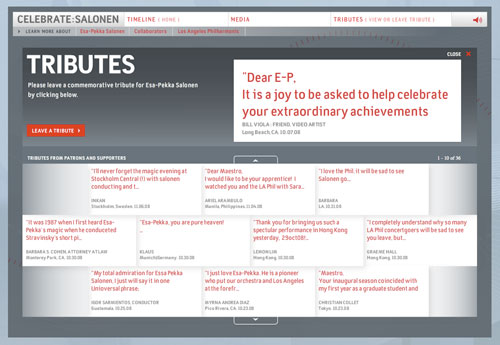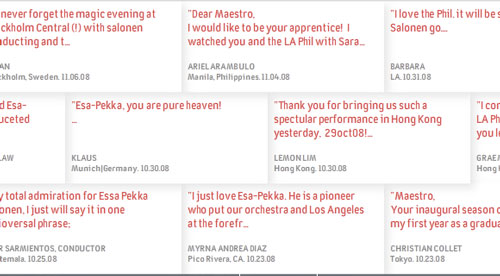I don’t completely (heart) the fancy Celebrate Salonen season site that the LA Phil put together, but I do appreciate the alliteration potential and the gesture.
Two cool things: 1. The fact that you can hover over any timeline point with an eighth note graphic and an interview will start without your having to click on it, and 2. the wall on which you can leave your tribute to Salonen.

 I’ve mentioned this before, but I’m big into the juxtaposition of, you know, Bill Viola’s thoughts on Salonen with Lemon Lim from Hong Kong’s thoughts on Salonen. It gives an artist an air of importance and widespread relevance without making him or her seem intangible.
I’ve mentioned this before, but I’m big into the juxtaposition of, you know, Bill Viola’s thoughts on Salonen with Lemon Lim from Hong Kong’s thoughts on Salonen. It gives an artist an air of importance and widespread relevance without making him or her seem intangible.
I wonder if people are also saying snarky things, though, and the LA Phil just isn’t posting them. Maybe the site visitors can sense that it’s a “if you don’t have anything nice to say, don’t say anything at all” situation, but I doubt it. People are mean. Maybe I’ll post “I cannot effing WAIT for Dudamel!!” ((not true, by the way)), and see if it shows up.
Would it be too dangerous to have unmonitored message boards for orchestras on their websites throughout the season, and not just on special occasions such as this? People can be nasty, but at least when they’re nasty it means they’re engaged. Out of curiosity, I took a gander at the Boston Symphony Orchestra’s website and thought, “Oh, great! They have a Community section.” I assumed that meant message boards like this or this, but then I remembered the industry in which I work, and thought, “Riiiight: family concerts and volunteer opportunities.” Of course there’s nothing wrong with family concerts and volunteer opportunities, but it is interesting that, outside of the classical music realm in 2008, “community” has come to mean something completely different.
Back to message boards: are we afraid of negative comments and differences of opinion in classical music? Hilary wanted to put her bad reviews on her new website, and my first response was WHAT are you talking about; why would you do that? She figured people would see the reviews anyway – they’re out in the world, after all – so why not just admit that not every critic in the known universe thinks she’s the bee’s knees, as any artist quote page or press kit would suggest? On folkish/indie-rockish singer/songwriter Sam Amidon’s MySpace page, he includes the quote, “Amidon makes mistakes, lots of them…” Grapevine (Reykjavik), which is funny and eye-catching. Does it really add something to include the negative, though, or is it just a joke? Interestingly (enough), that quote does not appear on his website proper, so maybe posting bad reviews is OK on the sites for the kiddies, but not on the “official” sites? OK then.
Like (all) (/) (most) things, the root of this classical PR conundrum comes from the art form itself. In other musical genres – jazz, bluegrass, folk – making mistakes is cool; the art is in the imperfections, or whatever, and mistakes aren’t really “mistakes”. In classical music, we assume that mistakes aren’t made in performances (or composition, for that matter), so when a critic (or, in the case of a message board, a community member), criticizes something, it reads as an admission that the performer(s) have made one, and is consequently a completely negative entity. Constructive criticism doesn’t appear to be allowed to exist. The perception of classical musicians as perfect beings leads to all sorts of problems with perception: if The King’s Singers never mess up, how can I relate to them? I, Jane Human Being, mess up all the time!
Open-ended message boards may not be the solution to online community engagement for orchestras, but it’s worth thinking about what is (beyond simply having your 20-something intern create a Facebook page). And if we truly open ourselves up to criticism and commentary of all shapes and sizes and really put our flaws out there, will we attract more fans?
OK, now I brace myself for the negative comments to this post.

Hi Amanda, love the blog btw! I’m officially delurking.
I attended an Association of California Symphony Orchestra conference a few months ago, and listened in some marketing/blogging/internet sessions. I was there as a panelist for a blogging discussion as a representative blogger, and it was fascinating to hear things from an administrative perspective. One thing that kept on popping up was everyone’s HUGE fear of negative comments/reviews/PR (everyone as in people in symphony administration). Understandable, but as a blogger who’s trying to promote the arts to my generation (post-college-ish), my point was at least it will get people talking. People seem to be afraid to talk about classical music in its ivory tower, and it’s so revolutionary to say that it’s ok to call the Rachmainoff Concerto No. 3 a “bloody mess” for example, i.e. to talk about classical music in the same way we speak about pop music.
This was a long way of saying that I agree with you, and it’s great that people like you are talking about it. That’s awesome that Hilary wants to post her negative reviews as well; she just went up a notch in my book. I believe she’s performing in SF soon?
One thing about Facebook groups – I’ve joined a number of them, but I haven’t found them to be very helpful. Very few people will take the time to use them to send out reminders about upcoming concerts, etc. and it doesn’t seem to be a very good way for fans to connect either with each other or with the administration.
Indeed, Hahn Solo will be in SF around Thanksgiving. Readers please be advised that this shameless plug was asked for! I think Facebook works if you have someone on staff (or an artist him or herself) who really takes the time to work on it, and uses it naturally. You can always tell when someone who’s not completely comfortable is running the show. Thanks for commenting/reading! -AA
The hidden benefit to allowing negative or perhaps not-entirely-positive ideas to be posted in any online forum…blog, tribute page, etc…is that it gives your supporters the opportunity to “beg to differ”! And, of course, there is no more powerful message than having Joe or Jane the Blogger defend your brand for you. I’m sure if Hilary posted negative reviews, there would be people out there chomping at the bit to disagree with the disagreeable. I love the interactivity of the Web, particularly when it comes to creating a forum for discussing the good, the bad and the ugly of the classical music biz. And, thanks, Amanda, for keeping it going.
I posted a recent bad review on my quartet’s website (and plan to continue to do so, as needed). Same reasoning you mentioned from Ms. Hahn… if you google our group, it’s gonna come up. We may as well not try to hide it.
The review was particularly harsh on my compositions – not on the group’s performance – or the potential of the group. So there’s still something in there that I’d like people to see (even if my music didn’t work so well in the critic’s opinion). I can take it 😉
(And the pieces have room for improvement, I’m actually grateful for some honest feedback)
Anyway, in the print version, our photo was huge and the review was very small.
hi amanda –
I think this part of your post is really provocative:
“The perception of classical musicians as perfect beings leads to all sorts of problems with perception: if The King’s Singers never mess up, how can I relate to them? I, Jane Human Being, mess up all the time!”
it might just be perversity on my part but the thing I love about live performance is the possibility of people messing up. because people now can make their recordings so pristine and perfect and well balanced maybe the only thing that a live performance can offer that is unique to live performance is the terrifying excitement of potential disaster.
best,
david